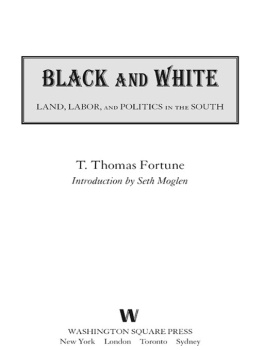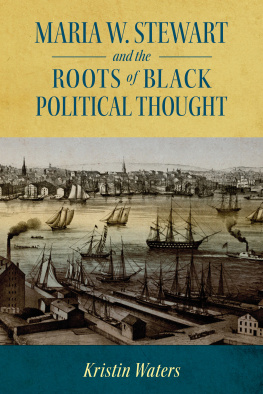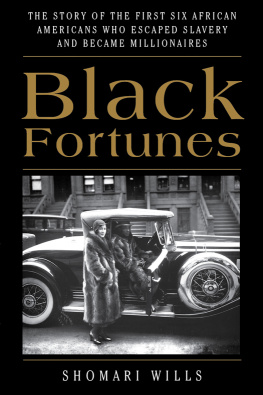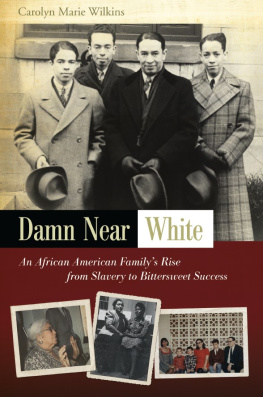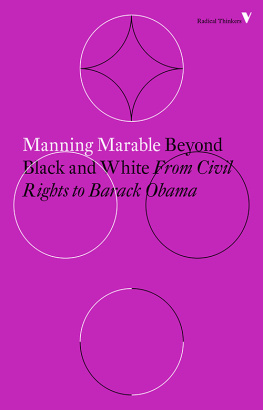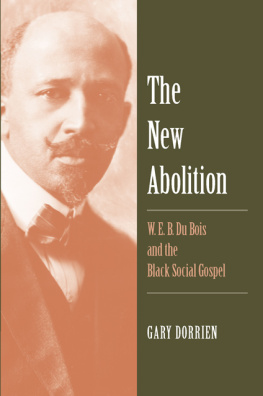 | Washington Square Press
1230 Avenue of the Americas
New York, NY 10020 |
Introduction copyright 2007 by Seth Moglen
All rights reserved, including the right to reproduce this book or portions thereof in any form whatsoever.
For information address Washington Square Press, 1230 Avenue of the Americas, New York, NY 10020
Library of Congress Cataloging-in-Publication Data
Fortune, Timothy Thomas, 18561928.
Black and white : land, labor, and politics in the South / T. Thomas Fortune;
introduction by Seth Moglen.1st Washington Square Press trade paperback ed.
p. cm.
Originally published: New York : Fords, Howard, & Hubert, 1884.
Includes bibliographical references.
1. African AmericansSouthern StatesSocial conditions. 2. African AmericansSouthern StatesEconomic conditions. 3. African AmericansSouthern StatesPolitics and government. 4. RacismSouthern StatesHistory. 5. Southern StatesRace relations. 6. United StatesRace relations. 7. Southern StatesEconomic conditions. 8. Southern StatesPolitics and government. I. Title.
E185.61.F74 2007
305.896073075dc22
2006052814
ISBN-13: 978-1-4165-5283-3
ISBN-10: 1-4165-5283-9
WASHINGTON SQUARE PRESS and colophon are registered trademarks of Simon & Schuster, Inc.
Visit us on the World Wide Web:
http://www.SimonSays.com
Introduction
Timothy Thomas Fortune was the most eloquent and influential African-American radical of the late nineteenth century. The leading black journalist of the 1880s and 1890s, he was also a militant activist who founded the Afro-American League, the first national political organization to fight for full equality for black Americans. Fortune is a decisive figure in the African-American protest tradition. In his writing and activism, he constituted a bridge between the militant visions of the black abolitionists and the rise of the Niagara Movement at the turn of the twentieth century. His influence on the generation of black protest leaders that followed him is concrete and direct. It was Fortune who gave W.E.B. Du Bois his first writing opportunities as a correspondent for his newspaper, and the young Du Bois viewed Fortune as a mentor and role model. It was Fortune who brought Ida B. Wells to New York to continue her anti-lynching campaign in the pages of his paper, the New York Age, when vigilantes in Memphis threatened her life and destroyed her press. It was Fortunes platform for the Afro-American League that provided a model for the NAACP. There is no way to understand accurately the contours of the modern civil rights movement, from Du Bois and Wells to Martin Luther King Jr., without understanding Fortunes intellectual and institutional contribution to it. And there can be no proper assessment of the nature and persistence of African-American economic radicalismfrom the Fourierism of Sojourner Truth to the contemporary visions of Angela Davis and Cornel Westwithout grasping Fortunes role in elaborating the economic intuitions of the black abolitionist generation into a coherent socialist analysis of racial capitalism in Black and White: Land, Labor, and Politics in the South .
Black and White is Fortunes masterpiece. The first socialist book written by an African American, it is a foundational text for the black radical tradition and a milestone in the intellectual history of the American Left. It is required reading for anyone who cares about the African-American freedom struggleand the wider movement for racial and economic justice in the United States. Having spent his own childhood in slavery and having survived the horrors of Reconstruction and its aftermath, Fortune set out in this book to explain why the abolition of slavery had not made African Americans free. In the first half of Black and White, he offers a passionate account of the ways in which white racism had deformed America from its inceptionand had doomed black people to slavery and, after emancipation, to unique forms of violence and discrimination. In the second half of the book, he argues that institutionalized racism was only one part of the problem and that the continued oppression of African Americans was also the result of an underlying economic system that had exploited the labor of black people during hundreds of years of slavery and that continued to exploit them (and poor people of other races) after the Civil War. He insists that if the legacy of slavery was ever to be overcome, and if the United States was ever to realize its long-betrayed promise of equality, there would need to be a fundamental transformation of the capitalist economic system as well as the elimination of white racism.
Despite its importance, Black and White is largely unread today. The reasons for this neglect are complex, as I will explain below, and they have in part to do with the paradoxical character of Fortunes later political development. But beyond these biographical complexities, Black and White has remained half-buriedacknowledged by experts but not widely readbecause it has always been an unsettling work. When it was first published in 1884, Fortunes book represented an exceptionally bold demand for racial and economic equality. It told painful truths about the role of white racism in American history and it called for fundamental change in the economic order. Most Americans have preferred not to face such provocations. With the exception of two short-lived reprints that appeared at the height of the modern civil rights movement, Black and White was out of print throughout the twentieth century. It is my hope that readers are, at last, ready for Black and White and that this edition will enable Fortunes most important work to reach the wide audience it deserves.
The Life and Career of T. Thomas Fortune
Timothy Thomas Fortune was born into slavery in Marianna, Florida in 1856. Emancipated with the rest of his family at the end of the Civil War, he came of age during Reconstruction, experiencing both its promise and its violent betrayal. Fortunes father, Emanuel, emerged after the war as a leader of Mariannas black community, which elected him to the Reconstruction-era Florida Constitutional Convention and then to the Florida House of Representatives. This period of hopefulness was shattered by the reimposition of white supremacy in northwestern Florida. The Ku Klux Klan murdered with impunity scores of African Americans in Marianna in the 1870s and drove Republican leadersincluding Emanuel Fortunefrom the town through a campaign of assassinations and death threats. This reign of terror broke the health of Fortunes mother and contributed to her early death. By the time he reached adolescence, Fortune had already learned the painful lesson shared by millions of freedmen and freedwomen: that the end of slavery had brought neither equality nor justice to African Americans. In a little more than a decade, his people had been politically disenfranchised, economically exploited, constrained by segregation, and terrorized by lynching and other forms of racial violence. Fortune would spend his adult life analyzing this unjust social order and seeking to understand how it might be resisted and transformed.
Like most former slaves, Fortune had limited opportunity for formal education. He attended a school set up by the Freedmans Bureau for a few months and, as a young man, he had the luxury of one year in the preparatory department at Howard University. Raised in a literate household, however, Fortune acquired a passion for learning early on and he was, like many nineteenth-century African-American leaders, prodigiously self-educated. As his writings make clear, he read voraciously in many fields, including history, politics, economics, and literature. He worked in print shops as a boy, which initiated him into the printers trade and, ultimately, led him into the journalists vocation. He served as page in the Florida state senate when he was a teenager, which stimulated his political ambitions even as it taught him disillusioning lessons about the realities of Reconstruction politics. As a young man, Fortune taught school in Florida for a brief timebut he found intolerable the racial indignities and outrages of the Jim Crow South. With his wife, Carrie, he moved to New York City in 1881 to pursue a career in journalism.

